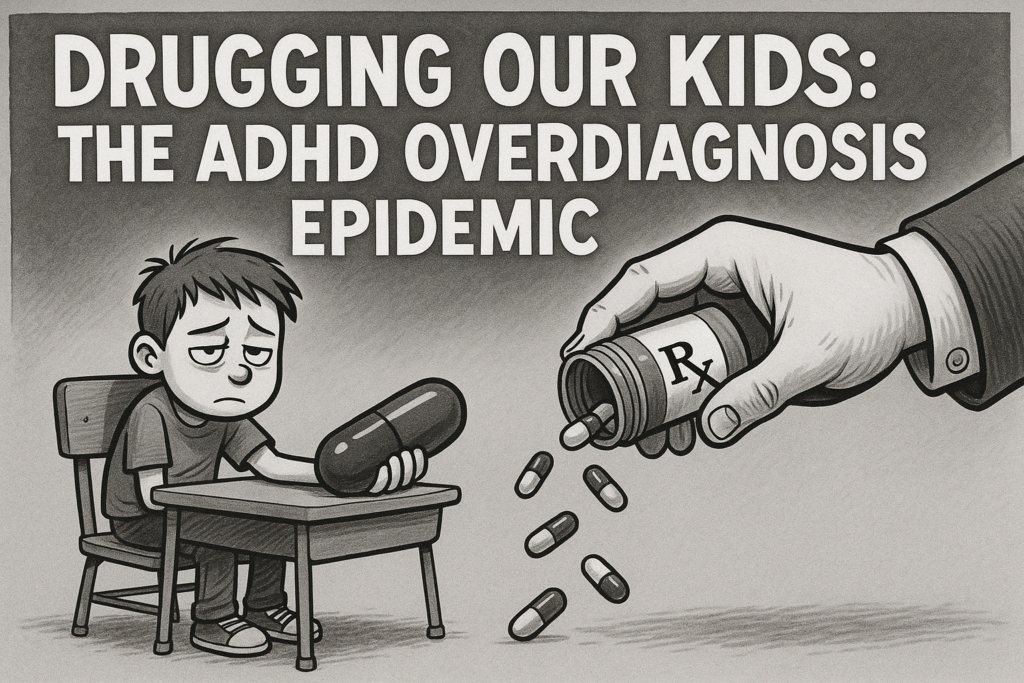
The number of children diagnosed with ADHD keeps climbing. So does the number of kids on medication. In the United States alone, over six million children have been labeled with ADHD. Nearly two-thirds of them are on stimulants. This is not just a trend. It is a crisis.
We are not talking about a few rare cases. We are talking about a system that treats childhood as a disorder and uses pills to control it.
When Normal Becomes a Diagnosis
A seven-year-old boy who cannot sit still for hours, who blurts out answers, who fidgets and daydreams, is now considered a problem. But he is not broken. He is not ill. He is a child. Yet in today’s schools, his behavior is flagged. He is sent to a counselor. He is referred for testing. Then the diagnosis comes, and the pills follow.
This is not about helping the child. It is about making him easier to manage.
Instead of questioning whether the classroom setup makes sense for young kids, we drug the ones who do not fit. Instead of offering more flexible instruction or more physical activity, we prescribe amphetamines.
This is not medical care. It is compliance enforcement.
The Business Behind the Diagnosis
ADHD is not just a diagnosis anymore. It is a product line. Pharmaceutical companies market it aggressively. Doctors prescribe it quickly. Schools embrace it quietly. Everyone wins. except the child.
The ADHD drug industry is worth billions. More diagnoses mean more pills. More pills mean more profit. That is the pipeline. The more restless or inattentive kids there are, the more money flows.
Parents are often told medication is the only solution. That their child will fall behind without it. That they are being irresponsible if they hesitate. But the truth is, parents are being pressured into decisions they do not fully understand. And kids are paying the price.
The Side Effects of Silence
These drugs are not harmless. They alter brain chemistry. They can cause anxiety, sleep problems, mood swings, and appetite loss. And we are giving them to kids as young as five. We are changing how their brains develop just so they can sit through a long school day that was never designed for their age group.
This is not treatment. It is damage control.
The worst part is that in many cases, these kids do not even have a disorder. They have energy. They have big emotions. They have trouble focusing because they are children. They are not malfunctioning. They are maturing.
We are not solving the problem. We are suppressing the symptoms.
Parents Have the Right to Say No
Parents are not obstacles. They are protectors. And they need to start acting like it.
If a school pushes for medication, ask questions. What alternatives have been tried? What support is in place? What changes could help before drugs are introduced? A diagnosis is not a command. It is a suggestion. And you do not have to accept it without a fight.
Because once your child is on those pills, getting them off is not so simple.
What Schools Will Not Admit
Here is what no one wants to say out loud. Schools benefit from medicated kids. They are easier to handle. They do not challenge the system. They do not disrupt the lesson plan. They sit. They listen. They comply.
But that is not learning. That is submission.
We need to stop calling this education. If we drug kids to make teaching easier, we are not teaching. We are controlling. We are flattening young minds to fit a rigid model, and we are calling it progress.
It Is Time to Fight Back
Childhood is not a disease. Energy is not a symptom. Questioning authority is not a condition that needs a pill.
We need to stop treating kids like problems to solve and start seeing them as people to support. That means resisting the pressure to medicate first and ask questions later. It means demanding that schools do better. It means trusting your gut as a parent, even when professionals try to override it.
Your kid does not need to be fixed. The system does.
So stop apologizing for protecting your child. Start pushing back. Because the future of childhood depends on it.
